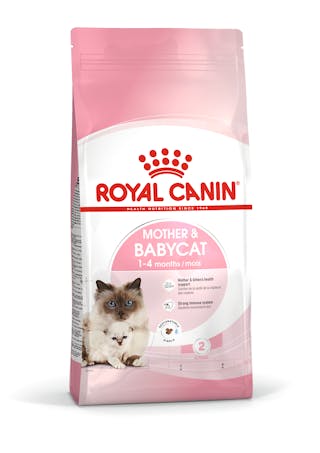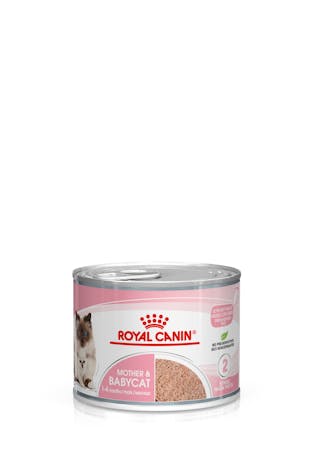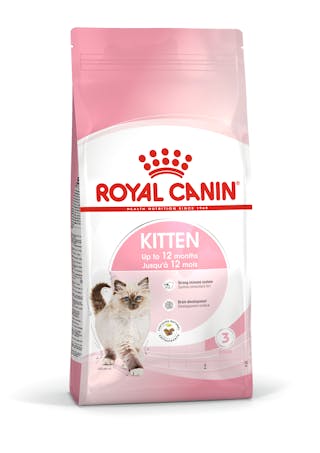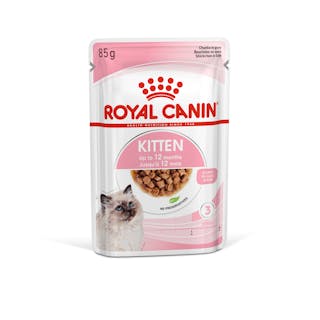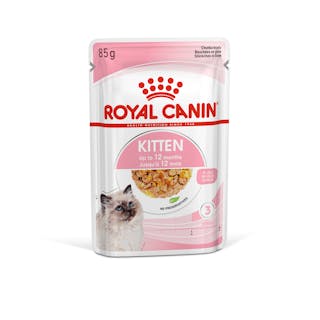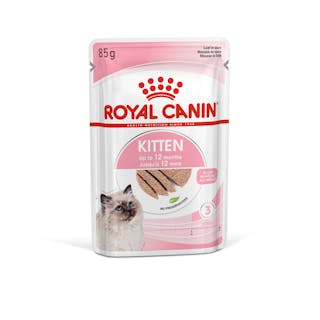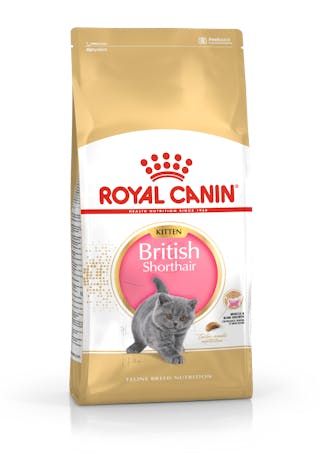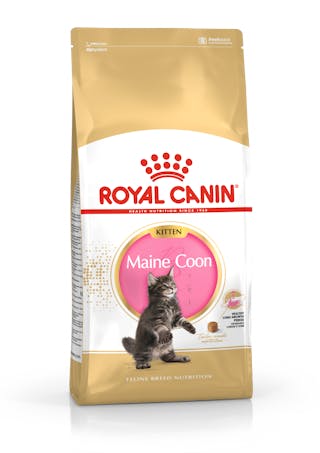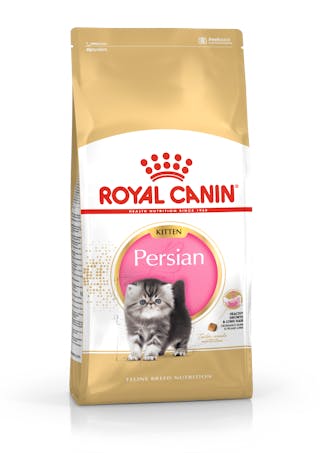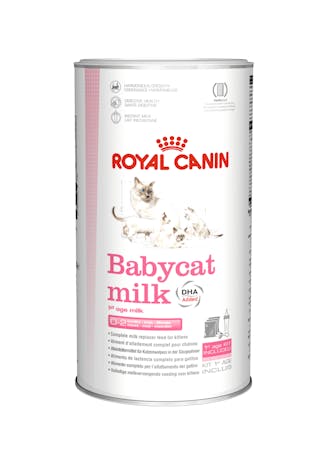
Discover our Kitten Growth Programme
Kittenhood is an amazing period as you watch this tiny meowing kitten grow, learn, and evolve. While this exciting time is filled with discoveries, it’s also the most delicate stage of your kitten’s life.
Within a year, their bones will harden and their brain will mature at an incredible pace so they can progress from being dependent on their mums into curious, playful and confident young cats. And with the right support you can help them build the foundations for a healthy life.


ROYAL CANIN® Kitten Growth Programme: a product range that grows with your kitten.
It is crucial to support your kitten’s needs with their greatest ally — the right food. Feed them a diet that takes into account the immaturity of their digestive and immune system, the fragility of their tiny teeth and their specific nutrient and calorie needs. That’s why, we have created the ROYAL CANIN® Kitten Growth Programme, a stage-based feeding programme created for all kittens up to one year old, to feed their specific physical and nutritional needs.
Let’s review these phases to better understand how a kitten-specific diet can make a difference to your cat’s future health.
From birth to 3 weeks
Neonate Phase
At this intense but brief stage, your kitten sleeps… a lot. After two weeks they’ll start to practise walking, slowly learning how to coordinate their steps. This is an intense period of adaptation during which they start to interact with their new world, while the amount of maternal antibodies progressively decreases in the milk and the kittens’ own antibodies level is still low. ROYAL CANIN® Babycat milk is formulated to contain highly digestible proteins to help optimise assimilation, and carefully selected nutrients to help support their natural defenses. ROYAL CANIN® Babycat milk has a similar lactose content to the queen’s milk and doesn’t contain starch (which cats can’t completely digest), to avoid upsetting their fragile digestive system.

Nutrition for the Neonate Phase

From 3 weeks to 4 months
Socialisation Phase
As they become more autonomous, kittens start learning and exploring more and here comes the time of social skills development! With all these changes, milk alone no longer provides enough energy and nutrients to sustain their new behaviour. Your kitten will need to transition slowly to ROYAL CANIN® Mother & Babycat kibbles and ROYAL CANIN® Mother & Babycat mousse, their first solid food, which is energy-dense and packed with nutrients.
From the eighth week, your kitten will reach the peak of their play game as they start running and climbing. It’s a vital period to build their most impressive skill — being able to keep their balance effortlessly on any surface. For this, they need food that supports their vision and their cognitive and muscle development. ROYAL CANIN® Mother & Babycat is rich in Omega-3 fatty acids such as DHA that helps support your kitten’s brain and vision development and has a high energy content to help assist their growth.
But remember, even if your kitten doesn’t fit in the palm of your hand anymore, they’re still a kitten and their digestive system is fragile, so they need specific food that is highly digestible to help support their growth and development without upsetting their digestive system.
Nutrition for the Socialisation Phase
From 4 months to 12 months
Adolescence Phase
At this stage your kitten’s growth will slow down as they mature into a well-proportioned cat. Your kitten is now ready to transition to a new diet, one that can support their immune system and the development of their body structure. ROYAL CANIN® Kitten is rich in antioxidants, such as Vitamin E, Vitamin C, Lutein, and Taurine that help support your kitten's natural defences.
From 4 to 12 months, kittens enter the last stage of their growth. Once they have been neutered, they need an updated formula, less dense but still fulfilling, to satisfy their appetite all the while maintaining a healthy weight. It’s important at this point to transition to ROYAL CANIN® Kitten Sterilised to help limit weight gain. Neutering modifies your kitten’s metabolism which may lead to weight gain and can potentially lead to obesity and its associated complications (diabetes, shortened life span, etc.).
Depending on the breed, your kitten will reach adulthood between 12 to 15 months. Your vet is the best person to advise you on exactly when this stage will happen for your pet and the best nutritional option.

Developed by vets
Designed by veterinarians in our Research & Development centres
Breeder tested
Checked with breeders to help ensure excellent nutritional benefits
Pet approved
Tested by 284 kittens worldwide
Brain development
What is at stake:
The first year is an intense and key development time for the maturation of your kitten’s brain, vision, and behavioural systems.
Nutritional answer:
A formula enriched with Omega-3 fatty acids (DHA) which helps to support brain development.
Immune system support
What is at stake:
After weaning, the maternal immune system protection declines overtime, and your kitten will need support to build their own strong immunity.
Nutritional answer:
A formula with balanced nutrients and adapted energy intake to support the development of their healthy immune system.
Microbiome support
What is at stake:
Kittens have a delicate digestive system. Their gut microbiota is slowly adapting from maternal or substitute milk to solid food. The development of their digestive enzymes, and their intestines is ongoing.
Nutritional answer:
A combination of prebiotics (MOS) & highly digestible proteins to help promote a healthy balance of intestinal microbiota for digestive health.
Weight management
What is at stake:
Weight issues can start early for kittens and can cause serious damage to their future health and wellbeing. Healthy habits, set early, are key to support your pet for life.
Nutritional answer:
A formula packed with the right nutrients and the right energy intake to help satisfy their appetite while fulfilling their growing nutritional needs without compromising their weight.

Mixed feeding: an essential part of your kitten's diet
As your kitten grows, their senses of smell, taste and mouthfeel are also developing–and mouthfeel is a serious matter for a cat around mealtime. Texture is an important part of their meals' experience; it strongly contributes to spark their curiosity and appetite. By offering them a variety of sensorial experiences you can make their feeding time even more stimulating. For each growth stage, dedicated dry and wet foods come with their own set of benefits for your pet’s health.
A range packed with responsibility
We’re leading the way towards sustainability with our new range of packaging. Discover how we’re working to help ensure that our packaging doesn’t go to waste and learn about our commitment to become certified as carbon neutral by 2025.
Check your kitten’s development with free, downloadable growth charts
You should ideally weigh your kitten every month until they are 6 months of age, then at least every 3 months until they become an adult. Based on WALTHAM research, the first Kitten Growth Charts are now available for you to download.
Choose between male and female charts for the domestic shorthair breed.
For kittens growing normally, you will see their plotted weight follow one of the centile lines on the chart. If their weight sits above or below these lines, it could mean that your kitten is too heavy or too light for their age. If you see a crossing of centile lines, this could indicate your pet growing quicker or slower than they should be and we would recommend you seek advice from your vet.
Watch the video to learn more about using the charts.
